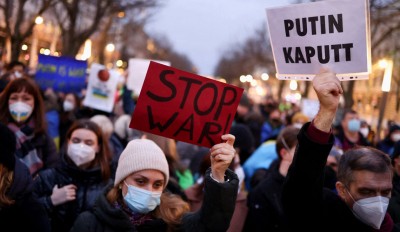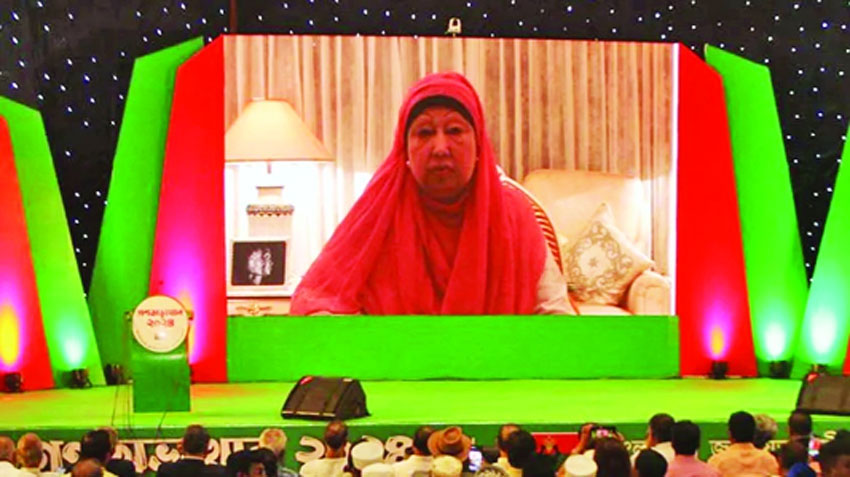- 2022-02-26 02:51:03
- LAST MODIFIED: 2026-02-04 19:55:07
Unsettling effects of Russian’s actions in Ukraine felt around the world
Peter Apps

Demonstrators hold placards during an anti-war protest in front of the Russian embassy in Berlin, Germany, February 22, 2022. REUTERS
As Russia prepared this week to invade Ukraine, chanting crowds celebrating France’s decision to withdraw from Mali held placards thanking the Russian private military contractor Wagner Group and newspapers in Kenya worried about the impact a conflict would have on the local cost of fuel and food.
From the chatrooms of China’s normally rigidly controlled Weibo social media platform to the newspapers of Latin America and the corridors of the United Nations, Russian President Vladimir Putin’s decision to recognise the independence of two breakaway regions in eastern Ukraine and deploy troops there has been unsettling a globally connected world.
On Thursday, Russian forces fired missiles at several cities in Ukraine and landed troops on its coast, officials and media said, after Putin authorised what he called a special military operation in the east. Russia’s military intervention was rapidly and widely condemned abroad.
For at least a decade, there has been an understanding that after years of largely unquestioned globalisation led by the United States, the world is more in flux and geopolitical tensions are on the rise, particularly in the face of a more assertive Moscow and Beijing. What has happened in the last week, however, looks to be prompting a sometimes dramatic reappraisal of how disruptive that might be, a realisation that what happens in eastern Europe will have implications for every part of the globe.
In some places, Russia is doing well. The withdrawal of France and military allies from Mali is widely seen as a victory for the Kremlin, with demonstrators in the capital Bamako photographed holding placards reading “Merci Wagner”, although Putin has said the Wagner Group does not represent the Russian state and is not paid by it. Two senior US defence officials have said there are between 800 and 1,000 contractors from the Wagner Group in Mali and that the number of Russian mercenaries in the West African country is expected to increase.
Moscow has also increasingly been supplying arms to Myanmar’s military, according to a report by the United Nations human rights expert on the southeast Asian country, and has signed a new friendship treaty with Azerbaijan to deepen its influence in Central Asia.
More broadly, however, Putin’s actions are seen as dangerous and unsettling.
Within Europe, condemnation has been widespread. The most damaging shift from Russia so far is likely to be Germany’s decision not to certify the Nordstream 2 pipeline. But even Hungary, which has moved closer to Russia under Prime Minister Viktor Orban, has shown its concern by announcing it will move troops near its own border with Ukraine for security purposes and humanitarian tasks. Budapest also did not block new European Union sanctions against Russia.
KENYA COMMENTS LAUDED
For those further from Ukraine, the most immediate impact is likely to be from the knock-on effect on global markets and on food and fuel. Ukraine is the world’s largest grain exporter, with several other major exporters also shipping through Black Sea routes that could be blocked. Oil prices have risen on expectations Russia’s energy exports will also be hit.
That will hurt poorest countries hardest – and major newspapers in Kenya ran stories on the impact on the cost of living. Kenyan Ambassador Martin Kimani’s comments to the United Nations Security Council, in which he called on all nations to learn to live within their borders, even those drawn by other countries, received global coverage and widespread praise.
Some countries have been more cautious. India, for example, has long sought to maintain friendly links with Russia even as its tensions with China worsen and it moves closer to Washington on other matters. Putin’s actions this week, however – including his speech on Monday night in which he questioned Ukraine’s right to exist as a nation – may have raised eyebrows even in Beijing.
While Beijing has been broadly supportive of Moscow, Chinese media have largely talked down the prospects of a serious conflict. But this week there was an unusual level of debate over the international situation among social media users on Weibo. A hashtag on a statement from Ukraine’s embassy in Beijing was among the most viewed on the platform, with separate statements from Russia, the United States, Britain and France.
WORLD “IN TENSION”
Initial sentiments on Weibo were largely negative on Russia’s actions even before Thursday’s military action, with one user describing them as “shameless”. Over the course of Tuesday, these were gradually replaced with more anti-US comments. Some other users continue to make negative comments on Moscow’s long-term relationship with China, with one user asking if Beijing could use similar grounds to take back nearby territory such as Vladivostok in Russia.
Others noted Beijing’s broader quandary on Ukraine. A successful Russian military intervention might set the tone for similar Chinese action on Taiwan, but there are also concerns that Putin’s recognition of the two separatist self-proclaimed people’s republics in eastern Ukraine could set a precedent that might ease the path to Taiwan’s outright independence.
While Chinese pundits might sometimes talk up Beijing’s own prospects in a war to push back US influence, the last week has been a reminder that in the rest of the world such behaviour remains frowned on almost without exception. Across Latin America – another area where Moscow has looked to increase its influence, particularly through vaccines since the start of the COVID-19 pandemic – coverage outside its immediate allies of Venezuela, Nicaragua and Cuba has been almost entirely negative.
Newspapers in Peru, Uruguay, Argentina, Colombia and Brazil blamed Putin for raising what Argentina’s La Nation called the “phantom of war” in Europe. Mexico’s left-wing, normally anti-US La Noranda accused the Russia leader of putting the world “in tension”.
That tone extends across much of the world, at least for now. Some commentators, however, seemed to welcome Putin’s blurring of the rules earlier this week. In Egypt, locked in a row with Ethiopia over the construction of a huge hydrophone dam on the Blue Nile, some saw Putin’s actions as something their own government should choose to emulate. “The Egyptian people want a positive move,” wrote one user on Facebook earlier this week, talking positively of “what Russia has done with Ukraine”.
Such views, however, are likely to remain limited. This week, as always, all the signs are that there is dislike, fear and resentment of unnecessary wars across the world. It is something Putin might do well to remember in the days and weeks ahead.
Source: REUTERS










